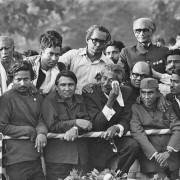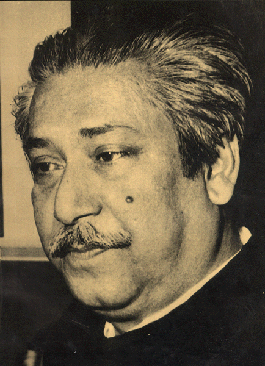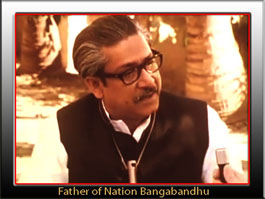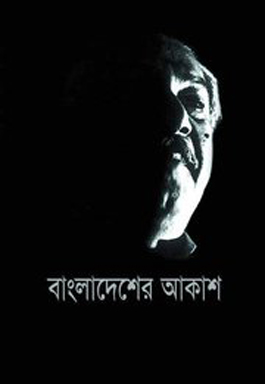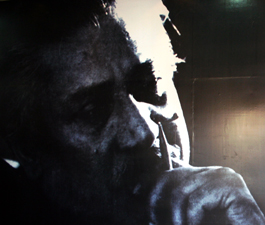IMMORTAL BANGABANDHU
“This may be my last message, from today Bangladesh is independent.
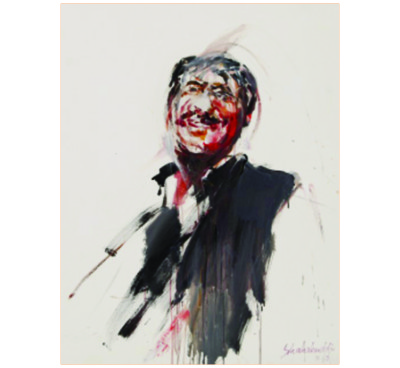 I call upon the people of Bangladesh, wherever you might be and whatever you have, to resist the army of occupation to the last. Your fight must go on until the last soldier of the Pakistan occupation army is expelled from the soil of Bangladesh and final victory is achieved.”
I call upon the people of Bangladesh, wherever you might be and whatever you have, to resist the army of occupation to the last. Your fight must go on until the last soldier of the Pakistan occupation army is expelled from the soil of Bangladesh and final victory is achieved.”
Sheikh Mujibur Rahman
26 March 1971
The people of Bangladesh have proved to the world at large that they are a heroic nation, they know how to achieve their right and live like human beings.
We have achieve our independence. So long a Bangali lives, he will not allow this independence to be lost. Bangladesh will continue to exist as an independent country in history. There is no power on earth which can keep Bangladesh under subjugation.
Bangabandhu
Those who cannot maintain law and order cannot expect to be a great nation.
Independence is not achieved with the hoisting of the flag only. Ensuring the security of people’s lives and property is also an inseparable part on independence.
It is only through agriculture revolution that the country would become self-reliant in food. The farmers must see to it that not an inch of the country’s soil remains fallow and that the yield of the land is increased.
Bangabandhu
I have waged the independence movement of Bangladesh along with seven and a half crore people. So I appeal to the people to put an end to the activities of antisocial and disruptive elements.
My dear brothers of armed forces, you belong to the people and people belong to you. You do not form a separate entity. All of you are sons of the soil. This is why you will have to share the happiness and sorrow of the masses and stand beside them in rebuilding the devastated country. Allah is with you.
Our defence-preparedness is not meant to attack anyone. It is for self defense only. We are not willing to interfere into other’s internal affairs. Similarly, we shall not tolerate other’s interference into our internal affairs.
Bangabandhu
The heartless beasts, army personnel killed the architect of BANGLADESH.
The martyrs who gifted the independence of the country will never die. The souls of the martyrs will be contended only when the people of this independent country, established through the sacrifice of the martyrs, will get enough to eat and live a dignified life.
Depending on borrowed resources no nation can ever expect to become self-reliant and great.
I have made appeals to the world for help. I want help. But not at the cost of independence.
Armed forces alone cannot defend a country. It’s people who defend a country.
It is clear today that only democracy will work in future in this country.
Bangabandhu
The Army Personnel has killed :
Sheikh Mujibur Rahman
Begum Fazilatun Nesa
Sheikh Kamal
Sultana Kamal
Sheikh Jamal
Parveen Jamal
Sheikh Russell
Abu Naser
Sheikh Fazlul Huq Moni (nephew) Begum Arju Moni (Moni’s wife)
Colonel Jamil Uddin Ahmed (security chief) Sukanta Babu
Abdur Rob Serniabad Baby Serniabad
Arif Serniabad Shahid Serniabad
Nephew of Serniabad SI Siddiqur Rahman
Nayeem Khan Rintu 4 caretakers
3 guests 5 in neighboring Mohammedpur area killed by artillery shells (Shahabuddin, Amiruddin,Nasima, Rijia and Rasheda)
Killers of Mujib and his family
The Murder of young Sheikh Russell
Unlike the assassins of Alende of Chili, who only killed Alende but spared his family members and relatives, the assassins of Sheikh Mujib killed 31 people besides Sheikh Mujib. They killed his pregnant daughter-in-laws and did not even spare his 8 year old son, Sheikh Russell. So far we knew that the artillery soldiers shot the Sheikh Mujib family as instructed by their officers. But Dr Wajed Myan’s account on the murder of Sheikh Russell shows that the artillery officers were personally involved in the massacre: “………………Russell ran down to take shelter among the people put already in line at gun point for execution. Abdur Rahman Roma, who looked after Russell for years, was holding his hand. A little later one of the soldiers took Russell from Roma to send him out of the house. Russell, frightened to death, burst into tears and begged for life: “For God’s sake please don’t kill me. I’ll be forever your servant if you let me live. My Hasu apa (sister Sheikh Haisna) and brother-in-law live in Germany. I beg you, please send me to Hasu apa and my brother-in-law in Germany.” Moved by Russell’s tears, the said soldier hid Russell in the sentry box at the main gate of the house. Half an hour later, a major seeing Russell hiding there, took him upstairs and killed Russell in cold blood by shooting on his head with his revolver.”
Dr Wajed Miyan: Some events involving Sheikh Mujib and Bangladesh

